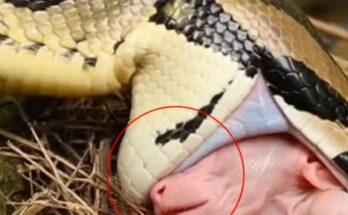
The monkey—named Kavi by his rescuers—had been born in captivity. His earliest memories were filled with the clanging of metal bowls and the constant hum of human voices. He had never known the calls of other monkeys echoing through the canopy or the thrill of swinging freely from branch to branch. Every inch of his world had been measured and safe. Predictable. And though he had been fed, washed, and even played with by his keepers, there was always something missing—a piece of himself that lived beyond the cage.
When the sanctuary decided he was ready to return to the wild, they transported him to a protected forest reserve. To them, this was a success story. To Kavi, it was a terrifying plunge into the unknown.
The first night was the hardest. The forest, with all its natural beauty, was deafening to him. Every rustle of leaves sounded like danger. The chirping of crickets and the croaking of frogs kept him awake, his eyes darting from shadow to shadow. Once, a branch cracked under a passing animal, and he scrambled up a tree, heart pounding, clutching the bark as if it could save him from an invisible enemy.
Food, once placed neatly in a silver dish, was now something he had to find on his own. The first few days, he barely ate. He did not know which fruits were safe or how to catch insects. The scent of ripe bananas from a distant grove tempted him, but so did fear. What if something else waited there? What if he was hurt, and no kind human came to help?
Other monkeys occasionally appeared, watching him curiously from afar. They chattered and swung through the trees effortlessly, their movements graceful and confident. Kavi tried to mimic them once, attempting a small leap from one branch to another, but he slipped and fell. The others scattered, leaving him alone and embarrassed. The sting of isolation cut deeper than the bruises on his arms.
Days turned into weeks. The forest did not change for him, but something inside him began to shift. Hunger forced him to learn. Fear taught him caution. Slowly, instinct—a voice buried deep within—began to whisper. He learned which fruits were sweet and safe. He learned to listen for the soft warning calls of birds when danger approached. He even began to climb higher, testing his limbs against the wind.
Still, fear never completely left him. Sometimes, when the moon was high and silver light touched the treetops, Kavi would look toward the edge of the forest where the sanctuary fence glimmered faintly in the distance. Part of him longed to go back—to the predictable hum of electricity, the safe rhythm of feeding time, the sound of human laughter. But another part, the wild part, was awakening.
One morning, as he sat quietly on a branch, he heard a soft rustle nearby. A young monkey emerged, smaller than him, curious but cautious. She tilted her head, observing him with bright eyes. For the first time, Kavi didn’t look away. He reached for a fruit, split it in half, and offered it to her. She accepted, and they ate together in silence.
It was a small moment, but something broke open inside him—a barrier he didn’t know he’d built. The forest didn’t seem quite so threatening anymore. The shadows were still there, but they no longer felt like traps. They felt like mystery. Like life.
Over time, Kavi became part of the forest’s rhythm. He still startled at sudden noises, still looked back when the wind rustled too loudly, but he also learned to laugh—his own shrill, joyous call echoing through the trees. He was still scared, yes, but fear had changed its shape. It was no longer a cage. It was simply a part of survival.


